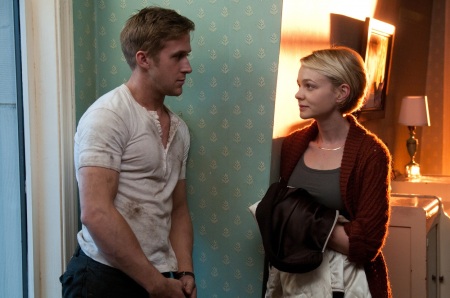
There’s nothing singularly new or original in Nicolas Winding Refn’s crime-drama Drive. Nevertheless, it is a gratifying alternative to the usual frenzied features that tear through mulitplexes every summer, or the tedious independent films that suggest great import but offer hollow trifles. I said something similar about The American last year and, while Drive doesn’t deliver the same measured and assured direction of Anton Corbijn’s film, it still manages to cruise confidently along without succumbing to the temptation for bedlam.
The slightly uneven direction is revealed early when a Hollywood stunt driver (Ryan Gosling, going moniker-less as… well… Driver) executes a deft and brilliantly timed post-heist getaway. He rewards himself for this prowess by inexplicably walking away without collecting his payment. Such a slip-up needn’t, however, detract from the fact that it was, indeed, a remarkably impressive sequence that answers the ageless Los Angeles question: how does one effect a vehicular disappearance from police helicopters? This heightens a greater threat posed later when Driver finds himself evading another car helmed by a faceless autoist who matches his skill weave for weave.
Lacking a compelling story, Refn wisely keeps the dialogue to a bare minimum. He and cinematographer Newton Thomas Sigel do much with little. Moments linger without the insecure need to cut away or cut it short. It’s rare that a movie can express more intimate emotion in a single simple gesture than most romantic comedies try to convey over their entire length. It’s rarer still that such emotion can be later imperiled by a single tense line.
Perhaps Refn’s primary downfall is wearing his influences on his sleeve (Mann, Scorsese, Coppola, P.T. Anderson). His love of the 80s is evident in Cliff Martinez’s Tangerine Dream-inspired score and the 80s-influenced pop soundtrack. While the score works beautifully, the soundtrack is often at odds with the action to the point of satire.
For an actor who hasn’t the most intimidating voice, Gosling succeeds by turns in being both warm and menacing. Whether threatening women or thugs, he makes credible use of what he has. Carey Mulligan, with her cherub-doll looks, gives her character perhaps more poise and polish than she deserves. Albert Brooks plays convincingly against type as one of a two-man criminal organization, with Ron Perlman completing the duet.
Films like Drive are always a refreshing welcome, especially at the end of a usually raucous season. Though it doesn’t quite have a fresh perspective, it is still a wonderfully executed and absorbing drama.
Disagree? That’s fine by me. Share your thoughts below.

You must be logged in to post a comment.